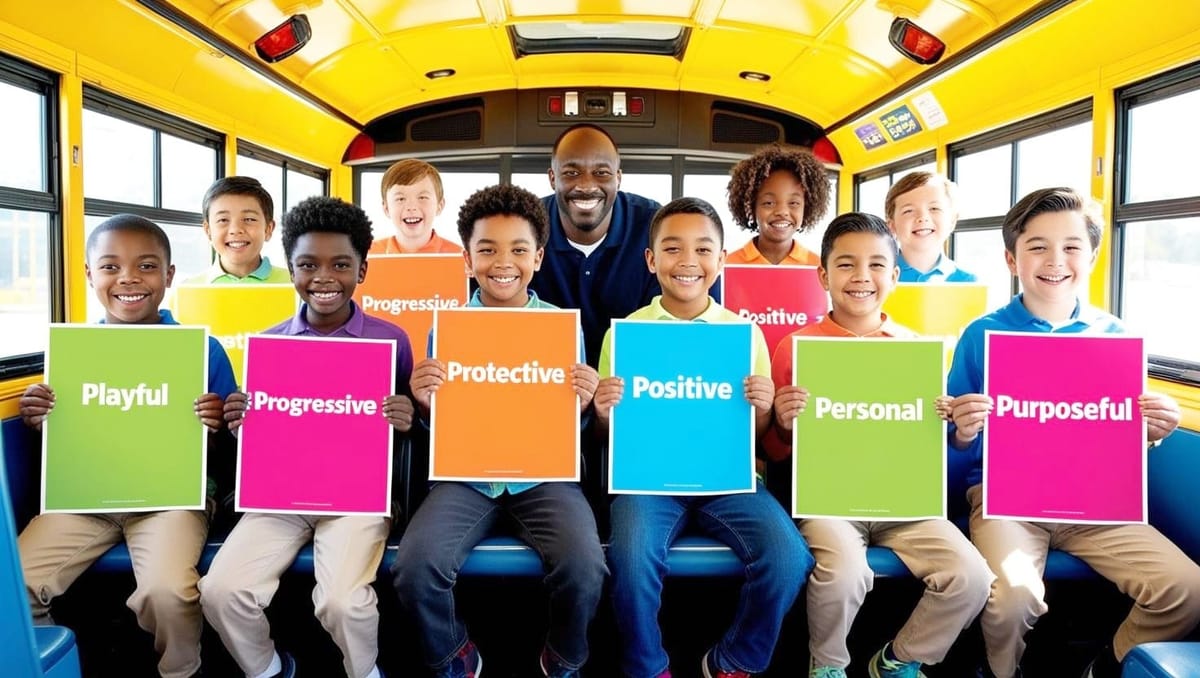The Six Ps of Purposeful Parenting

Purposeful, Personal, Positive, Protective, Progressive, Playful
What Is Purposeful Parenting?
Dear Reader
Thank you for asking such a straightforward and important question: What is purposeful parenting?
Purposeful parenting is an approach centered on intentionality, emotional connection, and long-term growth, not just correcting immediate behavior. It means parenting with thoughtfulness rather than unconscious reactions. For instance, instead of yelling when your child spills juice, you pause, breathe, and treat the moment as an opportunity to teach something deeper, which will be beneficial now and as the child grows.
When my friend Aisha became a mom, she promised to raise her daughter differently than she had. Her childhood had been strict, silent, and often cold. There were rules, but rarely reasons. Hugs were rare, and praise even rarer. She wanted to break that cycle—and she has.
Aisha and other parents can be inspired and supported by the 6 Ps principles of purposeful parenting, rooted in wellness guidance from pediatric experts and child psychologists, including the American Academy of Pediatrics [1]. The six Ps are Purposeful, Protective, Personal, Progressive, Positive, and Playful. These are simple but powerful guides for parenting with love and intention.
If you, like Aisha, are trying to build a parenting style rooted in warmth and connection—even without having seen it modeled—this guide is for you.
1. Purposeful
Purposeful parenting means responding thoughtfully rather than reacting emotionally. It’s about parenting with the future of your child in mind rather than focusing on short-term fixes.
Instead of shouting, “What were you thinking?!” if your child hits a peer, instead take a breath and ask yourself: What lesson do I want to teach here—respect, responsibility, or self-control?
How to Practice It:
- Be conscious of teachable moments.
- Pause before reacting. Ask: What value do I want to teach or reinforce at this moment?
- Speak to teach, not to shame.
Activity: Write down 3 core values you want your child to grow up with. Post them somewhere visible as daily reminders.
2. Protective
Children grow best when they feel physically, emotionally, and mentally safe. Protective parenting is not about controlling every detail. It’s about creating secure boundaries that allow freedom within the structure.
How to Practice It:
- Set clear, loving boundaries.
- Enforce routines that make life feel predictable and safe.
- Monitor digital activities.
- Observe friendships to ensure they are safe.
Why This Matters: Consistency builds trust. When children feel safe, they are more open to exploring, learning, and growth.
3. Personal
Every child is a unique combination of temperament, curiosity, and emotional rhythm. A personal approach recognizes that what works for one child may not work for another, and that is okay since one size doesn’t fit all.
How to Practice It:
- Ask open-ended questions like, “What made you smile today?”
- Discover their love language, strengths, and preferred learning style.
- Adjust your tone and expectations based on your child’s personality.
Why It Matters: Feeling known and accepted for their identity builds a child’s self-worth and deepens your connection.
4. Progressive
Parenting is not a fixed set of rules—it’s a journey. As your child changes, so should your approach. Progressive parenting means staying open to new insights, techniques, and feedback.
How to Practice It:
- Stay curious. Read parenting books, join supportive parenting circles, and attend parenting sessions.
- Reflect on your upbringing and decide what to keep, revise, or release.
Why It Matters: When you model flexibility and growth, your child learns that evolving is part of being human.
5. Positive
A positive parent emphasizes strengths over flaws. Encouragement builds confidence, while constant criticism erodes it. Children thrive when they feel seen and celebrated.
How to Practice It:
- Catch them doing something good and say so out loud.
- Praise effort and character (“You were very patient today”), not just outcomes.
Why It Matters: Your words shape their inner voice. Choose ones that uplift and empower.
6. Playful
Play is a child’s language—it’s how they learn, express, and connect. A playful parent brings lightness into routines and joy into discipline.
How to Practice It:
- Make clean-up a race.
- Use silly voices at bedtime.
- Turn transitions into songs or stories.
Why It Matters: Laughter builds bonds. children feel emotionally safe and develop holistically when love feels fun and relaxed.
From Struggle to Strength
If you didn’t grow up with emotional warmth, these practices may feel awkward or even foreign. That’s okay. Purposeful parenting is not about perfection—it’s about presence. It’s about trying again, learning alongside your child, and choosing connection over control. With time, these Ps can become second nature, creating a legacy of love that your children will carry forward.
How the 6 Ps Align with the GREATEST Roadmap
If you’re familiar with the GREATEST Roadmap, you’ll notice how beautifully the 6 Ps align:
- Purposeful, Playful, and Progressive connect naturally with G for Growth—where children grow emotionally, physically, and mentally through exploration, creativity, and curiosity.
- Personal aligns with T for Temperament, and Positive mirrors R for Relationship and Routine.
These two frameworks complement each other, providing parents with a richer toolbox.
We’d Love to Hear from You!
Have you heard of the 6 Ps principles before? Have you tried it out? Did it shift something in your parenting or your child’s response? Drop a comment or share your story—we’re building this community together.
[1] Adapted from principles aligned with the American Academy of Pediatrics' guidance on nurturing, emotionally responsive parenting.